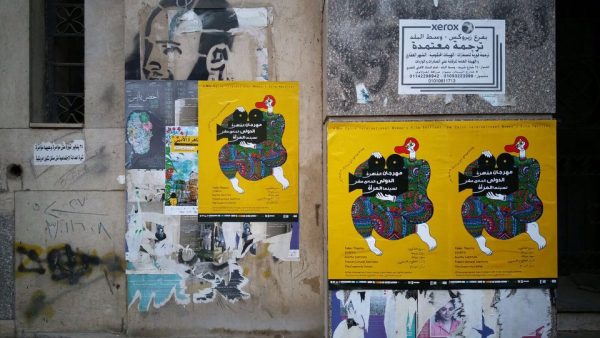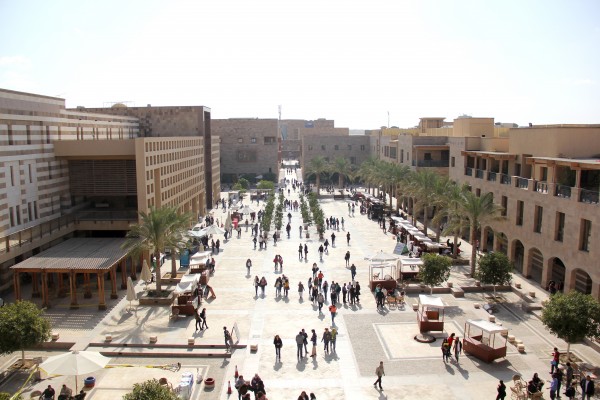Cairene Cinema Celebrates Women Behind the Camera Lens
By Mariam Ismail
Follow @mariam_ismail1
The 11th edition of the Cairo International Women’s Film Festival (CIWFF) brought together numerous female directors to showcase 54 film screenings starting on March 3, held at various locations across Cairo, such as Zawya Cinema, The Goethe Institute, The French Cultural, Institute, and the Creativity Center.
The CIWFF is an annual event that showcases films directed by women from all over the world. A volunteered committee comprised of four women in the film industry come together every year to choose films that are important to be shown in their opinion.
“The angle and focus of women in film, usually introduces a new perspective into the field, especially since it is so dominated by men,” said Fesitval Coordinator Salma Shukrallah.
If you go to any film festival nowadays, you’ll notice that almost all the directors are men, however, women have been producing a lot of films lately with angles that should not be overlooked, she added.
The CIWFF offers female directors the platform for expression. Not only were women given the chance to showcase their work through film direction and production, but many of the movies focused on the lives of women and their experiences.
The women in the films spoke to the audience about taboo topics such gender inequality, domestic violence and virginity, but they also laughed about matters of love, friends, and family.
Many of the directors chose to shoot their subjects using close-up shots, giving the audience a sense of acquaintance with the women.
These emotive pieces, with their openness and honesty, heightened the reality of what it means to be a woman.
Waseem Wafik, one of the festival’s coordinators, says that this year marked an increase in the number of Arabs in comparison with the number of foreigners attending. He attributes this to the country in focus this year: Lebanon.
“Every year we choose a country of focus to highlight their women’s film achievements. This year we chose Lebanon and it is the first Arab country to be chosen by the CIWFF,” Shukrallah added.
“We selected Lebanon because of its unique filmmaking experience that has been evolving over the past years, and the leading role women have had in its recent cinema production, whether in features or documentaries,” the CIWFF said in its official Press Release.
An Arab audience watching films about the Arab world can connect to the content more, Wafik told The Caravan.
For example, the audience laughed out loud several times during Egyptian director Dina AbdelSalam’s film, Girls of a Feather.
A man in the audience whispered, “It’s as if I’m watching my own grandmother,” in response to scenes with elderly ladies talking amongst each other.
The scenery, the language, and the context of the film were all relatable to the Arab audience.
On the contrary, the Italian film, Last Century Girls, directed by Concita De Gregoria and Esmeralda Calabria, which featured many humorous interviews, did not have the same reaction from the audience who were occupied with reading the translated subtitles.
While Girls of a Feather showed a light reality of elderly women in Egypt, going out for a meal of fish and joking amongst themselves, Last Century Girls provided an insight into a much harsher reality as elderly woman recounted their tales of hardships that came with being women in early 20th century Italy.
The CIWFF screenings are all free of charge and open to the public.
“It gives the audience a greater initiative to come and explore the movies,” says Wafik.
Members of the audience are then given ballots for every film they view.
The ballots have the film name and a rating measurement from one to five, with five being the highest. At the end of the screening, they rate the film, and submit these ballots.
These ballots decide the winner of the year’s CIWFF.
“The idea that the winner is audience selected adds to the appeal and the participatory feel of the festival,” says Wafik.
This year, the CIWFF chose to add a new element to their festival with their introduction of the Rough-Cut Workshop.
“We [launched] an open call for Arab female directors to submit their rough-cuts, and we selected six of them and they will be [discussed with] an international jury,” Shukrallah told The Caravan.
The jury will give the directors feedback and then select the best film(s) to be offered post-production support, or the opportunity for their film to be edited abroad in collaboration with international film schools.
Another new feature this year is the addition of an animation section, featuring animated films produced and directed by women.
“We got many submissions that were animation, and we realized this was an important film genre to highlight as well,” says Shukrallah.
By giving the opportunity for women to screen their films and get access to audience Q&A’s, and the overall ratings, the women in the film field are given a new way to appreciate and asses their work as filmmakers.



